Adata’s XPG Gammix S70 Blade is the second fastest NVMe SSD we’ve tested, bettering Samsung’s excellent 980 Pro by a smidge—the drive it replaces in the number two spot. It’s also PlayStation 5 compatible and offers a large improvement in real world performance over its predecessor, the previously reviewed and fast-in-its-own-right XPG Gammix S70.
This review is part of our ongoing roundup of the best SSDs. Go there for information on competing products and how we tested them.
Design and features
The Blade omits the massive, permanent (in terms of warranty) heat sink that made the older S70 unsuitable for laptops. It instead opts for a thin heat spreader that’s included in the package, but not pre-attached. The second big change is a switch to 176-layer TLC NAND, replacing than the 96-layer NAND found in the S70. Otherwise, it’s the same standard M.2 2280 (22mm wide, 80mm long) SSD using the same Innogrit IG5236 controller.
There’s still 1GB of DRAM cache per terabyte of NAND, and about a third of the NAND can be treated as SLC for secondary caching purposes—333GB for the 1TB version and 666GB for the 2TB version I tested. As the drive fills up, those amounts drop.
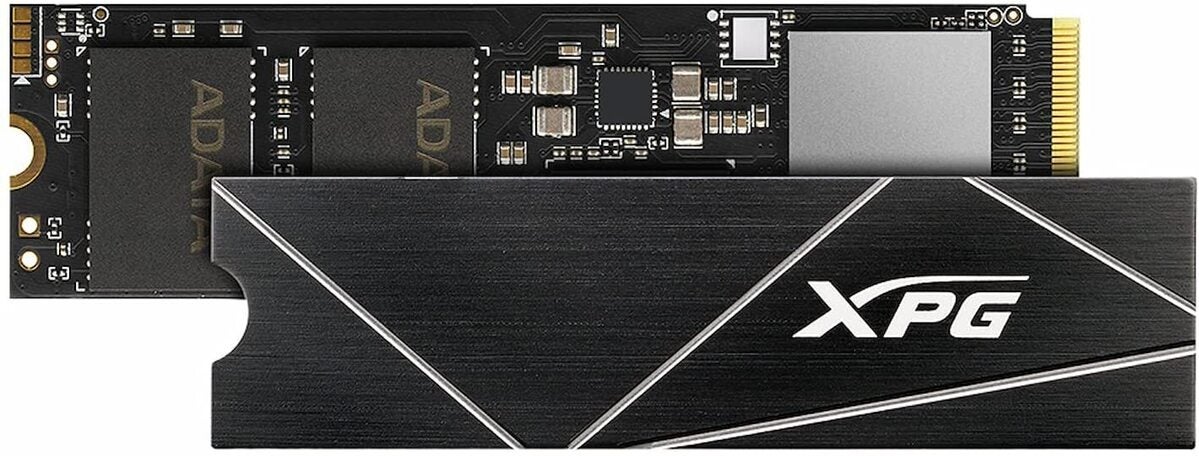 Adata
AdataAdata’s S70 Blade opts for a thin heat spreader and 176-layer NAND rather than the massive heat sink and 96-layer NAND utilized by the older S70.
As you might guess from that last paragraph, the drive ships in two capacities: 1TB (currently about $150 at Amazon), and the 2TB version (currently around $300 on Amazon) Both carry a five-year warranty and are rated for 740TBW (TeraBytes that can be Written) and 1480 TBW, respectively.
Performance
Though it couldn’t quite match the mighty (and mighty expensive) Seagate FireCuda 530 overall, the Adata S70 Blade did manage to best it in CrystalDiskMark 6’s write test. It held its own in a number of other tests, and bested or ran neck and neck with Samsung’s excellent 980 Pro in a number of other tests.
Note that Adata issued a firmware update post-testing that promises an uptick in performance.
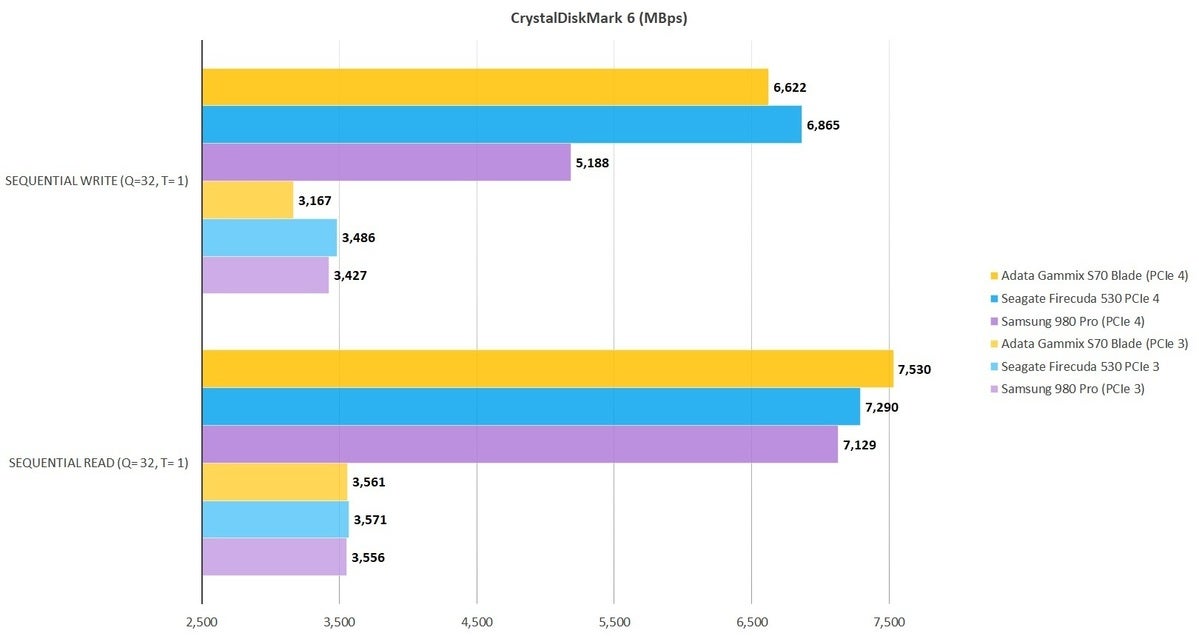 IDG
IDGThe S70 Blade actually outpaced the otherwise top dog FireCuda 530 in CDM 6’s sequential read test. Yowser. Longer bars are better.
In the 48GB transfer tests shown below, the Adata S70 Blade place third. Well behind the FireCuda 530, but only a shade off the 980 Pro
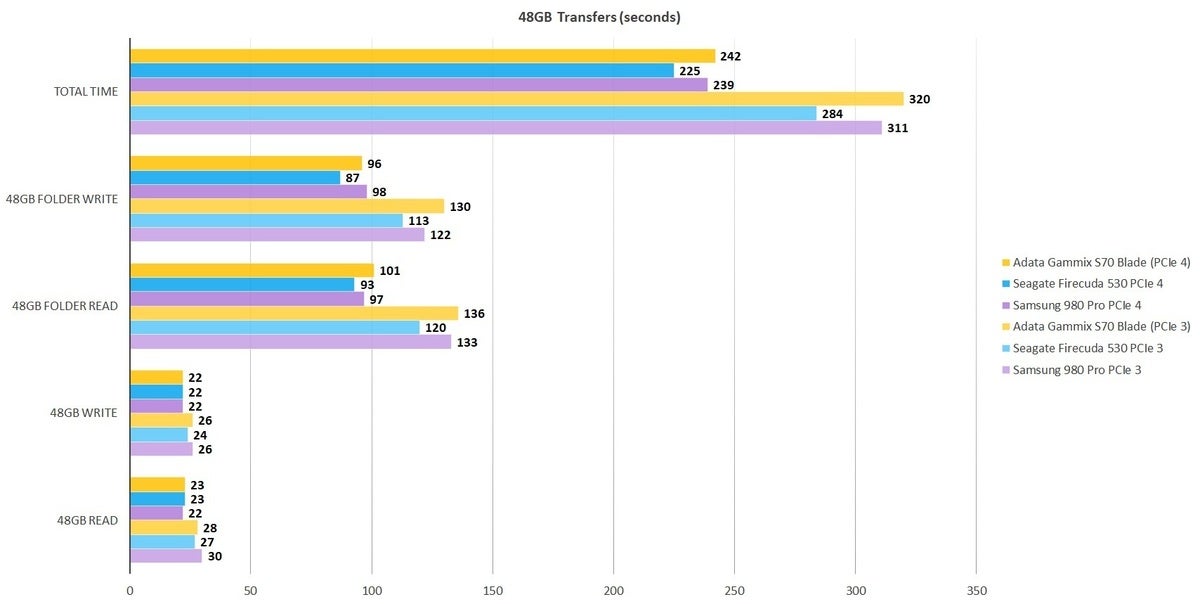 IDG
IDGNothing beats the FireCuda 530 when it comes to real world read and writes, but the S70 Blade acquitted itself quite well. Shorter bars are better.
Those PCIe 4 numbers are also a massive improvement over the older S70, whose real-world performance over the latest generation of the transport technology didn’t quite match its gaudy synthetic benchmark results. See below.
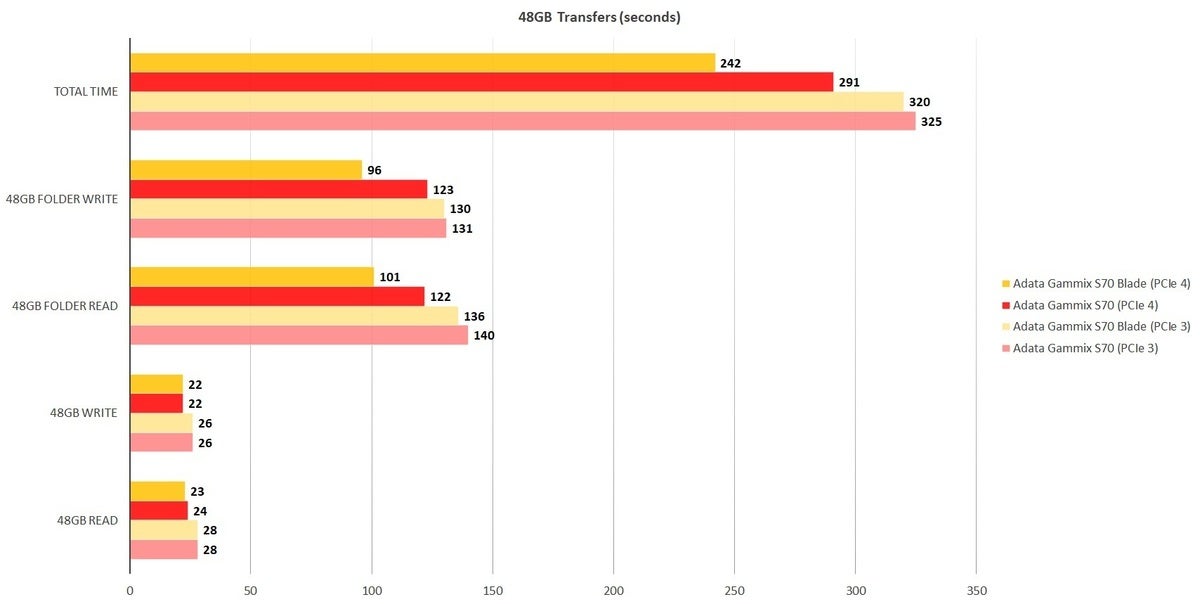 IDG
IDGThe S70 Blade’s real world performance transferring files and folder over PCIe 4 is massively improved over the older S70.
The test where the XPG Gammix S70 Blade actually knocked the Samsung 980 Pro from its second-place perch was in our long 450GB write test. Writing this much data continuously shows where secondary cache runs out. On the better drives such as the FireCuda 530, Samsung 980 Pro, and S70 Blade, it doesn’t. At least not on an empty 2TB drive.
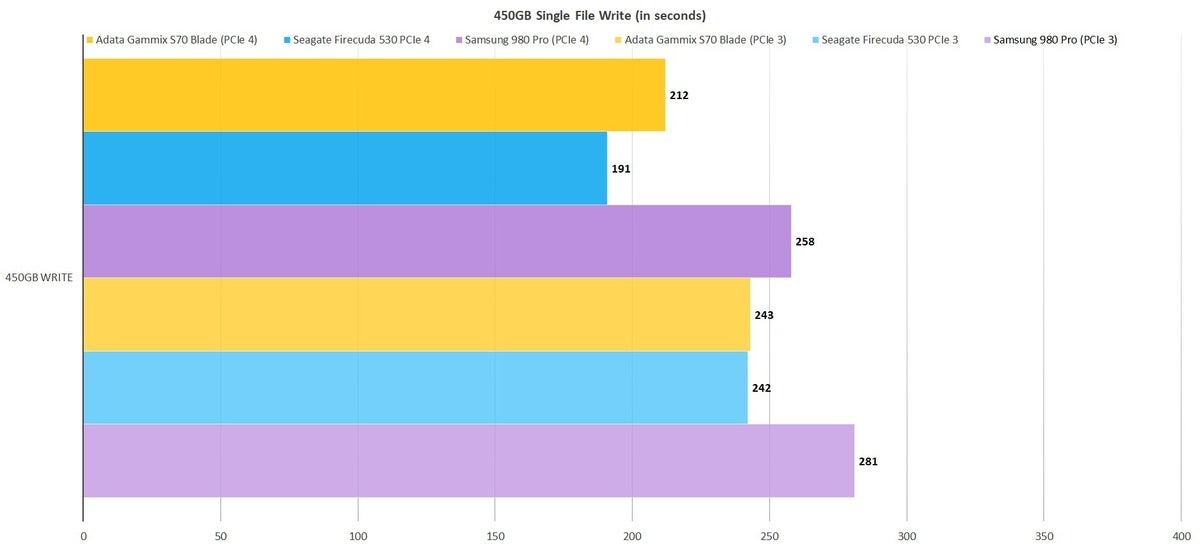 IDG
IDGThe S70 Blade is a significantly faster drive with super long copies (450GB) than the Samsung 980 Pro and actually managed to outpace the FireCuda 530 over PCIe 3. Shorter bars are better.
As you can see above, the S70 Blade almost matched the FireCuda 530 over PCIe 3. A one second difference in this test is well within the margin for error.
The PCIe 3 tests utilize Windows 10 64-bit running on a Core i7-5820K/Asus X99 Deluxe system with four 16GB Kingston 2666MHz DDR4 modules, a Zotac (NVidia) GT 710 1GB x2 PCIe graphics card, and an Asmedia ASM3242 USB 3.2×2 card. It also contains a Gigabyte GC-Alpine Thunderbolt 3 card, and Softperfect Ramdisk 3.4.6 for the 48GB read and write tests.
The PCIe 4 testing was done on an MSI MEG X570 motherboard socketing an AMD Ryzen 7 3700X 8-core CPU, using the same Kingston DRAM, cards, and software. All testing is performed on an empty, or nearly empty drive that’s TRIM’d after every set of tests. Performance will decrease as the drive fills up.
Conclusion
As tested, the Adata XPG Gammix S70 Blade is one of the best NVMe SSDs on the market, and clearly superior to the older S70. It’s more than competitive with the Samsung 980 Pro performance-wise, and available at nearly the same price.
Of course the S70 Blade isn’t the Seagate FireCuda 530, but neither is any other SSD—and the FireCuda is priced much higher as a result. Sadly, the 530 wasn’t actually available at the time of this writing. Happily, the S70 Blade is. It’ll save you a few bucks, and it’s darn fast in its own right.
Note: Adata has caught flak for swapping in slower parts over the life of certain SSDs, namely the XPG8200 Pro. You can read about it here.
Stay connected with us on social media platform for instant update click here to join our Twitter, & Facebook
We are now on Telegram. Click here to join our channel (@TechiUpdate) and stay updated with the latest Technology headlines.
For all the latest Technology News Click Here
For the latest news and updates, follow us on Google News.
